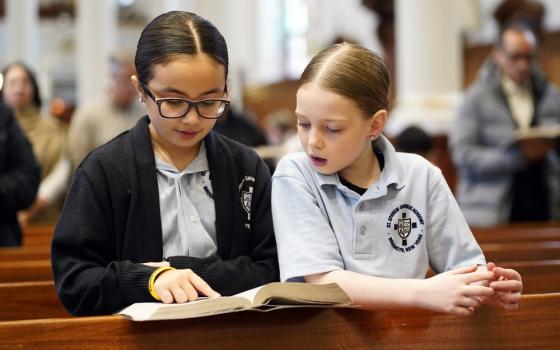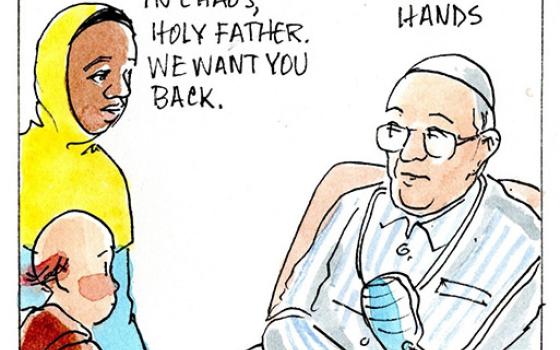
Broken and Shared: Food, Dignity, and the Poor on Los Angeles' Skid Row
By Jeff Dietrich
418 pages, Marymount Institute Press, $29.95
If you are wandering in the 50-block area known as Skid Row in downtown Los Angeles and you ask directions to Hospitality Kitchen or where the Catholic Workers serve meals to the homeless, no one will know what you are talking about.
"This place," explains Catherine Morris, the gentle Catholic worker, "is and always has been known among the people as 'The Hippie Kitchen.' Since the beginning."
Catherine is author Jeff Dietrich's wife, who, together with various community members, has run the Catholic Worker Movement in Los Angeles since 1970. When NCR asked me to review Jeff Dietrich's book and attend the launch at Loyola Marymount University this past Sunday, I knew I needed to visit the kitchen to have an idea of their work in Los Angeles, a visit long overdue.
Catherine showed me around the hippie kitchen and the dining garden where they serve thousands of meals a week to the endless stream of homeless men and women who quietly stand in line for their meal. There were sturdy paper plates with salad and beans and garlic bread, as well as a table with a cooler with water in the garden. It was a beautiful day, and the noonday almost-winter sun shed clear light on the people and the simple Christmas tree in the corner. As closing time drew near, a group at the end of the line began singing a Christmas carol.
An African-American man came up to Catherine and said it had been a long time since they had seen each other.
"It had to have been 1973 or 1974, but I remember you, yes I do," he said.
As I looked at his face, I wondered where he had been for the last 40 years and what a story he could tell -- still homeless and still a gentleman. I caught sight of Jeff, dressed in black, checking out the crowd. He finally picked up a sign and stood at the door. The sign read: "The kitchen closes at 12:00." And while the kitchen may close at noon, if there is still food left, the volunteers move it outside and continue serving people, filling up used plastic coffee or food containers for people to take with them to eat later.
Catherine showed me the dental clinic and podiatry chair they have to move outside when the dentist comes once a week. A medical clinic is upstairs. The house even has special "shopping carts" they have made for about $50 to give to the homeless to cart their belongings. The merchants and police don't like them, but they are legal, though the house can only order them when it receives a sizable donation.
 There is even a lending library in a cabinet bearing a sign that says they are looking for a volunteer to run it.
There is even a lending library in a cabinet bearing a sign that says they are looking for a volunteer to run it.
"Most books don't come back, but that's OK," Catherine said. "We have some big readers here."
The Catholic Worker community and its friends and volunteers have created a serene space with two buildings and a garden where they serve the poor in the spirit of Dorothy Day and Peter Maurin. The aim: "To live in accordance with the justice and charity of Jesus Christ."
'Broken and Shared'
Jeff Dietrich's hefty 400-page book, "Broken and Shared," is part autobiography, part apologia pro vita sua and mostly theological reflection that brings the stories in the Gospels to bear on daily life.
This 64-year-old Vietnam War conscientious draft-dodger is not a big man, but he wields a mighty pen. (He is also not easily deterred. After submitting the manuscript to several publishers and receiving at least four rejection letters, Marymount Institute Press saw the light and accepted it for publication.)
There does not seem to be much to laugh about in "Broken and Shared," but Jeff told me when I chatted with him before the book launch that the workers and volunteers do laugh because things happen all the time. The poignant moments surrounding the deaths of those they care for are simple and beautiful, and hints of joy emerge.
It is important to know that Jeff and the Catholic Workers here in Los Angeles do not only feed the poor. They are advocates who work nonviolently for economic and social justice and peace for people because there is a link that binds together food, poverty, justice, violence, war and consumer capitalism. Jeff contextualizes these themes in the Gospel stories as a contemplative and perhaps a mystic would, but most certainly as a prophet would do. He is a man crying out in the city streets. The entire book examines society's dark corners and pushes out the walls standing between the believing and living the words of the Gospels in radical fidelity and authentic, transparent relevance and truth.
Jeff has been jailed more than 40 times for civil disobedience. In one of the most moving chapters in the book, Jeff tells of the sentencing process on April 8, 1991, in federal court for pouring blood and oil on the steps of the federal building in Los Angeles in protest of Desert Storm or the first Gulf War.
He tells of the indignity, the bodily inspections, the aloneness and separation from his wife and community, the prayer and fasting, and the inability to sleep as you wait the eight or 10 hours until your turn for sentencing comes.
The judge does not care about your cause; he just wants you to take a plea and probation. What is the use?
"It is this task, this penitential task of putting flesh upon the disembodied spirits of unseen suffering that keeps us here," Deitrich writes. "It is the desire to confront the elusive reality of war with its unacceptable truth that causes us to remain in this prison."
But because I review movies and television, I was struck by Jeff's analysis of family values in a chapter he has titled "Anti-Christian Family Values." He notes that Jesus "subverted almost every cultural structure and institution of his time" about the image of the family. Even Jesus' own family said he was out of his mind and offered him no support. Jesus also "smarted off" to his elders when he ran away from home at the age of 12 "to be about his father's business."
But today, though many think that "whoever wraps himself tightest in the mantle of family values will win" elections, "the whole thrust of God's Incarnation in Jesus Christ is meant to deepen our awareness of God's presence in our suffering neighbor."
Care for our neighbor, for the poor, the hungry, the sick, the grieving, make up the crux of Christian family values, according to the Gospels. Ignoring the poor or blaming the immigrant, the welfare cheat, gay people, the marginalized, is a diversion from authentic discipleship. It lets us off the hook so we don't have to make the effort to go beyond ourselves; it is to accept as good enough, as the author quotes Bonhoeffer, "cheap grace."
However, Dietrich explains, the biggest threat to this teaching of Jesus is "the impact of consumer capitalism," or, better yet, "the invasion of the family by market values." It is impossible to see the needs of one's neighbor through mountains of stuff.
Another section on "Image over Substance" is a hard-hitting assessment of our technological culture that impedes our ability to see others through the eyes of compassion and that adds the unseen consequences of a consumer culture on human life, the environment and peace.
Dietrich also offers a deep and cutting assessment of the military industrial complex that keeps America at the helm of global power at the cost of so many lives and so much treasure. This election year makes "Broken and Shared" essential reading for those who want to have a meaningful role in national life. However, Dietrich exposes the bare vestige of democracy left in the United States today. I don't think he is cynical; I think he is telling it as he sees it through the lens of the Gospel stories.
I asked Jeff if he ever wept for the sorrow he has encountered. He looked at me right in the eye and said, "I am a warrior; and warriors do not cry. They just keep going."
He paused and said that when this book came out, "Yes, I did cry."
He believes "Broken and Shared" to be his legacy. During the reading of some chapters of the book during the gathering for the book launch, Jeff became quite moved when reading about the life and death of Eugene Fejnas, who lived with the Catholic Worker community for 10 years.
"Broken and Shared" is not a doctrinal tome, but it is a work of theology. It is Jeff Dietrich's conviction and commitment to an ongoing faith seeking understanding in the Catholic tradition in the here and now, even if some might question his linguistic precision here and there. Dietrich is well read in so many areas, including history, semiotics, economics, technology and theology. He references popular culture, beginning the book with a recent statement by Stephen Colbert on serving the poor -- or not.
The book is assembled by themes but is very nonlinear, almost circular or concentric. One section increases what has come before to reach a gentle but deeply challenging finale made up of glimpses of the people who make up the Catholic Worker community or who visit there.
Within each of the 10 sections are chapters made up of Dietrich's writings from various decades that give the reader an undulating sense of never standing still. The format is, of itself, agitating. You have to keep thinking, checking in with your own experience, memories and most of all, faith life rooted in the Eucharist.
The book opens with the Gospel stories and concludes with an invitation to consider them again in the lives of the poor. Photos and illustrations complement the text and the index makes this book ideal for research and university or seminary courses. While I would have preferred a history of the Catholic Worker Movement in Los Angeles as well as a chronology of significant events by year at the beginning of the book, these have been placed at the end. The foreword is by Martin Sheen and the preface, "Where the Spirit Dares," is by Jesuit Fr. Daniel Berrigan.
To read "Broken and Shared," you need intentionality and the willingness to step into Jeff Dietrich's shoes and see the world, church, government -- indeed, the institutions of power wherever they exist -- as this disciple of Jesus, a man who chose to follow Christ long ago and continues to grow in wisdom and understanding. He seems tireless to me.
Perhaps the people who would benefit from reading this book the most will not do so because to enter into this experience is to change. And change is hard for the comfortable or those already convinced of their righteousness; the idea of inconvenience even worse. Yet all is grace, and here, for all, is a rendering of what the common good, equitable distribution of goods, community, family, prayer, faith, care for the earth, food and clean water, justice and peace look like -- the Scriptures alive in our world today.
[Sr. Rose Pacatte is a Daughter of St. Paul, director of the Pauline Center for Media Studies in Los Angeles, and reviews movies for NCR.]


